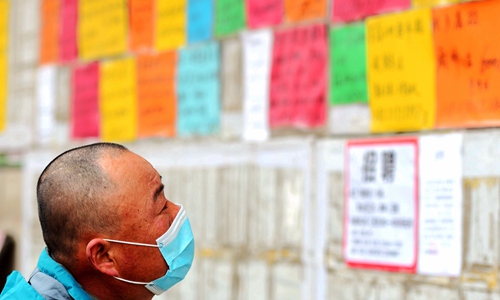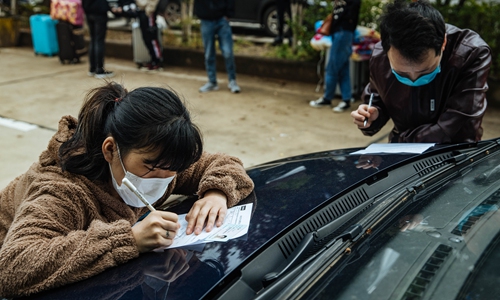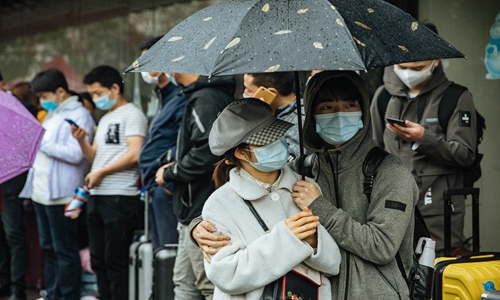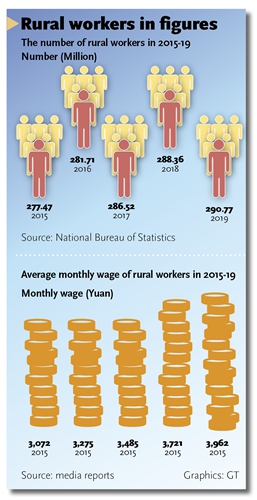GT Investigation: ‘All I can say is things are getting better’
By GT staff reporters Source:Global Times Published: 2020/4/27 22:58:40
Rural workers among the hardest-hit by COVID-19, but resumption underway
Editor's Note:
This is part II of a multi-part series of the Global Times' investigation into the severity of unemployment issues in China in the wake of the COVID-19 epidemic and the newspaper's response to claims of some foreign media that social unrest in China might be imminent.

Just three days after the Chinese New Year in late January, Zhang Hong, a 38-year-old construction worker from Central China's Henan Province, left his family behind and boarded a train to Beijing. His aim: To earn money.
But after three months of struggling to resume work, on April 10, Zhang boarded the same train back home and bid farewell to the Chinese capital he has worked in for five years. Instead of bringing money to support his family of three, Zhang went home with 8,000 yuan ($1,129.85) in debt on Alipay, an app for small consumption loans.
"My manager told me to wait, wait and wait, but I'm becoming more anxious day by day, because as long as the project is not finished, I will not get my payment," Zhang told the Global Times on Monday, referring to an interior renovation job for a newly wed couple.
What happened between Zhang's trips was the coronavirus epidemic, which saw much of China under lockdown for weeks and has since become a global pandemic, continuing to ravage the globe even today.
But while Zhang has decided to leave Beijing, Wang Xiaobao, a delivery man, originally from North China's Tianjing, stayed. He said that while it has not been easy for everyone, there is always hope if one remains healthy.
"I can earn only half of what I did before due to long waiting times that have dragged my speed in delivering orders… But I could live and find more opportunities here as long as I'm healthy," Wang told the Global Times on Monday.
The experiences of Zhang and Wang are vivid testaments to both the severity of the impact of the coronavirus on the jobs and livelihood of more than 290 million rural workers across the country, as well as their remarkable resilience in the face of an unprecedented challenge.
A Global Times investigation into the conditions of rural workers revealed that while many struggle to find jobs or have to take pay cuts, they are also backed by a raft of policy measures and a vast, fast-changing economic landscape that constantly offers new opportunities.
In contrast to how foreign media outlets have portrayed them as extremely poor with no educational background and always on the verge of causing social unrest, rural workers showed resilience deriving from long-standing values and traditions of saving money, improving living conditions in their hometowns and, above all, their ability to always find the slightest glimmer of hope in dark times.

Difficulties
Rural workers have been particularly vulnerable to COVID-19. With construction sites, factories, businesses being shut down nationwide and restrictions put in place, a vast majority of them were trapped at home and, for many, lost a lifeline for their families.
"Virtually all sectors that use rural workers, including manufacturing, construction and services, were shut down, so you can imagine how serious the issue is for these workers," Tian Yun, vice director of the Beijing Economic Operation Association which closely tracks migrant workers, told the Global Times on Monday.
Tian noted that ensuring employment for rural workers is one of the most challenging but important tasks in maintaining economic and social stability.
At the end of March, rural workers made up 70 percent of the 70-80 million workers in the country who hadn't returned to work, almost equivalent to the UK's population, according to a report that the China Finance 40 Forum, a think tank in Beijing, released on April 18. Based on their monthly average income of 4,000 yuan in 2019, that translates into a loss of 200 million yuan, the report said.
Still, those figures, while massive, do not provide a full picture of the pain that hundreds of millions of Chinese families have to face due to the pandemic.
For Zhang's family, not only did they not receive any income so far this year, they now have to find a way to pay off the 8,000 yuan debt he accumulated to cover his rent and other expenses in Beijing.
"My wife and my five-year-old son are still at home, and they also need money," he said, "I can't wait like this forever."
While Zhang decided to return to his family in Henan, many have no choice but to stay in Beijing.
A worker from Northeast China's Heilongjiang Province, who only gave her surname as Dang, said she has to stay at work to support her sick husband and her daughter in middle school back home, even though she only earns half of more than 5,000 yuan she used to make before the COVID-19 epidemic.
"I'm tired and exhausted, but I have to work. I have to support my family. My earnings are improving compared to that of March, but it's still half of what it was during the pre-virus period. It is so hard for me to cover basic expenses," Dang told the Global Times on Monday.

Resilience
However, in interviews with the Global Times, many rural workers expressed understanding of the extreme circumstances the coronavirus has brought to their lives and to their country. While many say life might not return to normal as it used to anytime soon, they also pointed that the light of hope is getting brighter at the other end of the tunnel.
"I treasure my work and life now, after going through everything, even the workload has almost doubled due to the strict anti-pandemic efforts in schools," Yu Hong, a canteen staffer at a school in Lianyungang, East China's Jiangsu Province, told the Global Times on Monday.
Asked to come back to the school in early March, Yu Hong has gone through a 14-day quarantine period before being allowed to go to work, and the quarantine fee was paid by the school she worked for. "Students have come back, and my work is also returning to normal."
While Yu was able to return to work largely because the country's full-fledged efforts have been proven effective in containing the coronavirus, others are able to find jobs during this difficult period because of the country's vast and increasingly evolving economy with new emerging sectors such as e-ecommerce.
Wang Xiaobo, the delivery man in Beijing, said that he might be luckier than many others who have lost their jobs or been forced to go back home because he works in an emerging sector that has been growing enormously during the epidemic.
Wang is not the only "lucky" one. Over the years, as the Chinese economy shifts toward services, an increasing number of rural workers have found new jobs in sectors other than manufacturing and construction. Powered by the prosperous e-commerce sector, there are over 3 million delivery men like Wang in the country. As many as 10 million rural workers now work in hospitality, retail and other services sectors, while more than 60 million still stay in construction and 80 million in manufacturing, according to the report from China Finance 40 Forum.
While China's hospitality and services sectors have also been hit hard by the COVID-19 epidemic, they can also recover relatively easily once the spread of the virus is contained, according to analysts.
Apart from new emerging sectors, China's rural workers can now also find jobs in their own hometowns with decent pay, as the country continues to pursue a more geographically balanced social and economic development path.
"The epidemic prevented many from going back, and some like me have already found work to do near our hometowns, as it's tough to find a job now in big cities anyway," Huang Xiang, who used to work at an assembling firm in Guangzhou, capital of South China's Guangdong Province but now has gone back to his hometown in nearby Dongguan about 90 kilometers away from Guangzhou, told the Global Times on Monday.
Huang is currently working at a local face mask factory. He saidthe payment is "OK," though not anywhere near better than when he was in Guangzhou.
The resilient and uplifting attitude of rural workers in the face of profound difficulties are also palpable in interviews with the Global Times. Contrary to the conflicts and tensions hyped up by foreign media outlets, many have an unmistakably rational message: There is always a way out and they will figure something out.

Support
Behind such resilience is a raft of policy measures to support rural workers and the rural economy not just since the outbreak began, but in recent years, under the country's poverty alleviation scheme and other long-term goals.
As of April 10, China sent out 18.8 trillion yuan in subsidies to impoverished families, according to the Ministry of Civil Affairs. Also, in the first quarter of 2020, China extended jobless benefits totaling 9.3 billion yuan to 2.3 million people and offered free transportation for 5.9 million rural workers to return to work, according to the Ministry of Human Resources and Social Security.
Top officials have also deemed protecting jobs as a top priority with more fiscal and monetary policies. Strict regulations are also scheduled to take effect on May 1 to curb delays in paying salaries to rural workers, which has become a prevalent issue of tension in the past years.
Overall, the living conditions of residents in the country's rural areas are improving. In 2019, dispensable income for rural families of areas in poverty increased by 11.5 percent to 11,567 yuan per person, according to data from the National Bureau of Statistics.
Due to long-standing traditions, many rural families usually save money for difficult times. In some areas, savings for rural families on average could be in the tens of thousands, according to some estimates, in comparison to some US families that cannot afford an emergency expense of $400.
That, together with a more rational understanding of the situation, is what could help rural workers through this dark period, like how Wang, the deliverer, has put it.
"I don't think things can get back to normal soon, as with the virus slowly disappearing, some impacts will linger on," he said, "But I can only say things are getting better."
This is part II of a multi-part series of the Global Times' investigation into the severity of unemployment issues in China in the wake of the COVID-19 epidemic and the newspaper's response to claims of some foreign media that social unrest in China might be imminent.

A man browses through wanted ads at an employment market in Qingdao, East China's Shandong Province on April 8. Photo: IC
Just three days after the Chinese New Year in late January, Zhang Hong, a 38-year-old construction worker from Central China's Henan Province, left his family behind and boarded a train to Beijing. His aim: To earn money.
But after three months of struggling to resume work, on April 10, Zhang boarded the same train back home and bid farewell to the Chinese capital he has worked in for five years. Instead of bringing money to support his family of three, Zhang went home with 8,000 yuan ($1,129.85) in debt on Alipay, an app for small consumption loans.
"My manager told me to wait, wait and wait, but I'm becoming more anxious day by day, because as long as the project is not finished, I will not get my payment," Zhang told the Global Times on Monday, referring to an interior renovation job for a newly wed couple.
What happened between Zhang's trips was the coronavirus epidemic, which saw much of China under lockdown for weeks and has since become a global pandemic, continuing to ravage the globe even today.
But while Zhang has decided to leave Beijing, Wang Xiaobao, a delivery man, originally from North China's Tianjing, stayed. He said that while it has not been easy for everyone, there is always hope if one remains healthy.
"I can earn only half of what I did before due to long waiting times that have dragged my speed in delivering orders… But I could live and find more opportunities here as long as I'm healthy," Wang told the Global Times on Monday.
The experiences of Zhang and Wang are vivid testaments to both the severity of the impact of the coronavirus on the jobs and livelihood of more than 290 million rural workers across the country, as well as their remarkable resilience in the face of an unprecedented challenge.
A Global Times investigation into the conditions of rural workers revealed that while many struggle to find jobs or have to take pay cuts, they are also backed by a raft of policy measures and a vast, fast-changing economic landscape that constantly offers new opportunities.
In contrast to how foreign media outlets have portrayed them as extremely poor with no educational background and always on the verge of causing social unrest, rural workers showed resilience deriving from long-standing values and traditions of saving money, improving living conditions in their hometowns and, above all, their ability to always find the slightest glimmer of hope in dark times.

Job seekers fill in application forms in front of the Lenovo company in Wuhan on April 19. Photo: Li Hao/GT
Difficulties
Rural workers have been particularly vulnerable to COVID-19. With construction sites, factories, businesses being shut down nationwide and restrictions put in place, a vast majority of them were trapped at home and, for many, lost a lifeline for their families.
"Virtually all sectors that use rural workers, including manufacturing, construction and services, were shut down, so you can imagine how serious the issue is for these workers," Tian Yun, vice director of the Beijing Economic Operation Association which closely tracks migrant workers, told the Global Times on Monday.
Tian noted that ensuring employment for rural workers is one of the most challenging but important tasks in maintaining economic and social stability.
At the end of March, rural workers made up 70 percent of the 70-80 million workers in the country who hadn't returned to work, almost equivalent to the UK's population, according to a report that the China Finance 40 Forum, a think tank in Beijing, released on April 18. Based on their monthly average income of 4,000 yuan in 2019, that translates into a loss of 200 million yuan, the report said.
Still, those figures, while massive, do not provide a full picture of the pain that hundreds of millions of Chinese families have to face due to the pandemic.
For Zhang's family, not only did they not receive any income so far this year, they now have to find a way to pay off the 8,000 yuan debt he accumulated to cover his rent and other expenses in Beijing.
"My wife and my five-year-old son are still at home, and they also need money," he said, "I can't wait like this forever."
While Zhang decided to return to his family in Henan, many have no choice but to stay in Beijing.
A worker from Northeast China's Heilongjiang Province, who only gave her surname as Dang, said she has to stay at work to support her sick husband and her daughter in middle school back home, even though she only earns half of more than 5,000 yuan she used to make before the COVID-19 epidemic.
"I'm tired and exhausted, but I have to work. I have to support my family. My earnings are improving compared to that of March, but it's still half of what it was during the pre-virus period. It is so hard for me to cover basic expenses," Dang told the Global Times on Monday.

A heavy downpour fails to stop a crowd in Wuhan, capital of Central China's Hubei Province from gathering at Foxconn to apply for a job early Monday. Photo: Li Hao/GT
Resilience
However, in interviews with the Global Times, many rural workers expressed understanding of the extreme circumstances the coronavirus has brought to their lives and to their country. While many say life might not return to normal as it used to anytime soon, they also pointed that the light of hope is getting brighter at the other end of the tunnel.
"I treasure my work and life now, after going through everything, even the workload has almost doubled due to the strict anti-pandemic efforts in schools," Yu Hong, a canteen staffer at a school in Lianyungang, East China's Jiangsu Province, told the Global Times on Monday.
Asked to come back to the school in early March, Yu Hong has gone through a 14-day quarantine period before being allowed to go to work, and the quarantine fee was paid by the school she worked for. "Students have come back, and my work is also returning to normal."
While Yu was able to return to work largely because the country's full-fledged efforts have been proven effective in containing the coronavirus, others are able to find jobs during this difficult period because of the country's vast and increasingly evolving economy with new emerging sectors such as e-ecommerce.
Wang Xiaobo, the delivery man in Beijing, said that he might be luckier than many others who have lost their jobs or been forced to go back home because he works in an emerging sector that has been growing enormously during the epidemic.
Wang is not the only "lucky" one. Over the years, as the Chinese economy shifts toward services, an increasing number of rural workers have found new jobs in sectors other than manufacturing and construction. Powered by the prosperous e-commerce sector, there are over 3 million delivery men like Wang in the country. As many as 10 million rural workers now work in hospitality, retail and other services sectors, while more than 60 million still stay in construction and 80 million in manufacturing, according to the report from China Finance 40 Forum.
While China's hospitality and services sectors have also been hit hard by the COVID-19 epidemic, they can also recover relatively easily once the spread of the virus is contained, according to analysts.
Apart from new emerging sectors, China's rural workers can now also find jobs in their own hometowns with decent pay, as the country continues to pursue a more geographically balanced social and economic development path.
"The epidemic prevented many from going back, and some like me have already found work to do near our hometowns, as it's tough to find a job now in big cities anyway," Huang Xiang, who used to work at an assembling firm in Guangzhou, capital of South China's Guangdong Province but now has gone back to his hometown in nearby Dongguan about 90 kilometers away from Guangzhou, told the Global Times on Monday.
Huang is currently working at a local face mask factory. He saidthe payment is "OK," though not anywhere near better than when he was in Guangzhou.
The resilient and uplifting attitude of rural workers in the face of profound difficulties are also palpable in interviews with the Global Times. Contrary to the conflicts and tensions hyped up by foreign media outlets, many have an unmistakably rational message: There is always a way out and they will figure something out.

Support
Behind such resilience is a raft of policy measures to support rural workers and the rural economy not just since the outbreak began, but in recent years, under the country's poverty alleviation scheme and other long-term goals.
As of April 10, China sent out 18.8 trillion yuan in subsidies to impoverished families, according to the Ministry of Civil Affairs. Also, in the first quarter of 2020, China extended jobless benefits totaling 9.3 billion yuan to 2.3 million people and offered free transportation for 5.9 million rural workers to return to work, according to the Ministry of Human Resources and Social Security.
Top officials have also deemed protecting jobs as a top priority with more fiscal and monetary policies. Strict regulations are also scheduled to take effect on May 1 to curb delays in paying salaries to rural workers, which has become a prevalent issue of tension in the past years.
Overall, the living conditions of residents in the country's rural areas are improving. In 2019, dispensable income for rural families of areas in poverty increased by 11.5 percent to 11,567 yuan per person, according to data from the National Bureau of Statistics.
Due to long-standing traditions, many rural families usually save money for difficult times. In some areas, savings for rural families on average could be in the tens of thousands, according to some estimates, in comparison to some US families that cannot afford an emergency expense of $400.
That, together with a more rational understanding of the situation, is what could help rural workers through this dark period, like how Wang, the deliverer, has put it.
"I don't think things can get back to normal soon, as with the virus slowly disappearing, some impacts will linger on," he said, "But I can only say things are getting better."
Posted in: SOCIETY